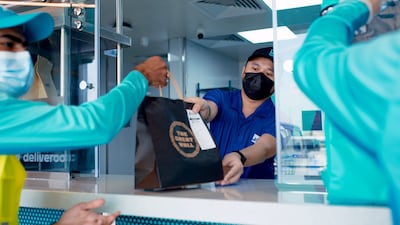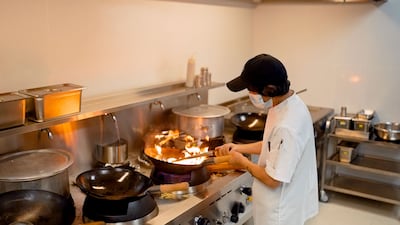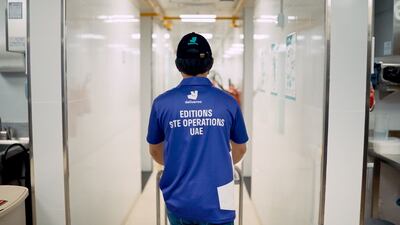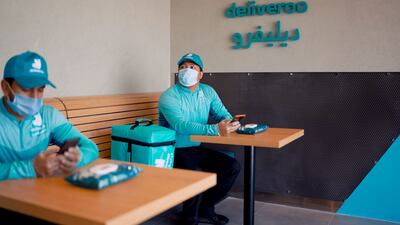Deliveroo said restaurants were snapping up space in its new "dark kitchen" – one of the largest facilities of its kind.
The site on Hessa Street, Dubai, allows restaurants to rent space in 12 huge industrial kitchens, to prepare food to be delivered by motorbike to customers.
The Deliveroo Editions hub was born out of demand from restaurants to distribute food faster, and to cater for new suburban communities such as Dubai Hills, said Fadel Belmahdi, head of Editions Middle East at Deliveroo.
Editions Middle East, Deliveroo
“Being situated here allows to reach newly developing communities such as Dubai Hills while also serving areas like the Marina and JLT, all within a maximum drive time of 20 minutes," he said.
“The new site allows us to reach the biggest possible market.”
Fleets of bike riders wait outside the hub – preferable to parking up outside malls and dashing in to collect food from traditional restaurants.
As in cities around the world, the pandemic has led to a dramatic increase in the number of people ordering food online, and acted as a lifeline to restaurants that were hit by lockdowns.
“The wide-scale adoption and penetration of online ordering was happening before the pandemic,” he said.
“This site was going to be built regardless. The pandemic accelerated it but the trajectory of online ordering was already moving very quickly by itself.”
The market for food delivery surged during the pandemic, in the UAE and abroad.
To serve their new stay-at-home market, restaurants pivoted to offer special takeaway menus and faster delivery times.
The way chefs prepared food also changed. Restaurants forced to close their doors could not afford rent, but continued serving their loyal customers through online platforms and closed kitchens.
Dark or ghost kitchens, which were never intended to serve dine-in customers, were conceived in New York in 2015 to serve the growing fast food takeaway market.
Demand during the pandemic accelerated the trend. Now the market research agency Euromonitor estimates the segment could create a $1 trillion global opportunity by 2030.
What is a 'dark kitchen'?
Commonly referred as 'ghost' or 'cloud' kitchens, these centres receive food orders placed online and prepare them to be sent out to customers.
They are not sited on the premises of the restaurants whose food they prepare. Instead, they are close to populous residential communities, to reduce delivery times.
Dark kitchens are designed entirely to fulfil delivery orders. As a consequence, they are often far more efficient than restaurants that serve both dine-in and takeaway customers simultaneously.
They can also be set up in areas with lower rents than those favoured by restaurants.
Why 'dark kitchens' are preferred?
Restaurants use "dark kitchens" to reach a wider variety of clients than would be possible if they relied on their own premises.
Customers are often unaware their meals have been prepared somewhere other than the restaurant they ordered from – and many people also attribute the term "dark kitchen" to absence of a dine-in area.
Delivery majors such as Deliveroo and Talabat use "dark kitchens" to house several delivery restaurants in one place, benefiting from economies of scale.
Some companies that use the model do not have a restaurant at all. These are referred to as virtual brands.
Are there 'dark kitchens' in the UAE?
Yes. Deliveroo has four in Dubai alone, with two on Hessa Street and others in Business Bay and Jumeirah Lakes Towers.
The food delivery company said more than a dozen restaurants would share the newest site on Hessa Street. Deliveroo says it is the biggest "dark kitchen" space in the world.
Talabat opened its first cloud kitchen in the UAE, in Abu Dhabi’s Khalifa City, in late 2020.
It now has 20 "dark stores" in operation in five emirates and plans to double that number by the end of the year.






